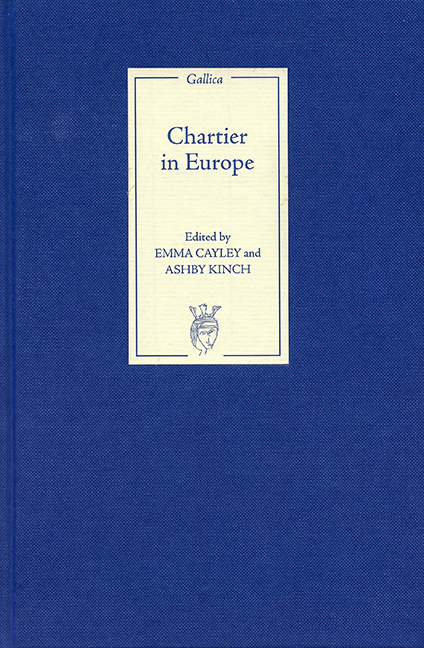Book contents
- Frontmatter
- Contents
- Foreword
- List of Contributors
- Acknowledgements
- List of Abbreviations
- Introduction
- Part I Authorising Chartier
- Part II Transmitting Chartier
- Part III Translating Chartier
- 8 From Invectivo to Inventivo: Reading Chartier's Quadrilogue invectif in Fifteenth-Century Castile
- 9 William Worcester Reads Alain Chartier: Le Quadrilogue invectif and its English Readers
- 10 The dit amoureux, Alain Chartier, and the Belle Dame sans mercy Cycle in Scotland: John Rolland's The Court of Venus
- 11 ‘La Crudele in amore’: Carlo del Nero Reads La Belle Dame sans mercy
- Bibliography
- Index
- Miscellaneous Endmatter
11 - ‘La Crudele in amore’: Carlo del Nero Reads La Belle Dame sans mercy
from Part III - Translating Chartier
Published online by Cambridge University Press: 24 October 2017
- Frontmatter
- Contents
- Foreword
- List of Contributors
- Acknowledgements
- List of Abbreviations
- Introduction
- Part I Authorising Chartier
- Part II Transmitting Chartier
- Part III Translating Chartier
- 8 From Invectivo to Inventivo: Reading Chartier's Quadrilogue invectif in Fifteenth-Century Castile
- 9 William Worcester Reads Alain Chartier: Le Quadrilogue invectif and its English Readers
- 10 The dit amoureux, Alain Chartier, and the Belle Dame sans mercy Cycle in Scotland: John Rolland's The Court of Venus
- 11 ‘La Crudele in amore’: Carlo del Nero Reads La Belle Dame sans mercy
- Bibliography
- Index
- Miscellaneous Endmatter
Summary
Very little is known about Carlo del Nero outside of the texts he left behind: a translation of Chartier's La Belle Dame sans mercy; La Quistione d'amore (1477), which is a translation of Chartier's Le Debat Reveille matin; and an original poem, Zibaldone, which his editor, Giuseppe Sansone, describes as ‘of very little worth.’ The explicit to his BDSM translation specifies that he completed it in 1471 while in Montpellier: ‘Finisce La dama sanza merzede translata per Carlo del Nero a Monpolieri l'anno 1471 di franzese in toscano.’ This explicit led Söderhjelm to speculate that he might have been a student or teacher at the famous medical school, though he never found any document to substantiate that possibility. Despite Del Nero's evident ability as a poet and the intrinsic interest in his re-casting of the poem, there has been very little critical attention to his text. Aside from two nineteenth-century editions by Fanfani and Söderhjelm, each of which had short headnotes, the only discussion before Sansone's new edition was Hoffman's somewhat dismissive assessment. Citing Söderhjelm, Hoffman found Del Nero's to be the ‘least faithful’ of the three extant vernacular translations of the BDSM and stressed the way it ‘wanders from the original’, though Hoffman's comments suggest that he did not engage the poem directly. Indeed, he cites Söderhjelm's negative judgment of the translation's accuracy (‘a number of errors and obscure passages not encountered in the French poem which, in many places, make the translation difficult to comprehend’), without noting that in the sentence just before, Söderhjelm had written, ‘In general, the whole introduction is much more lively and picturesque in the Italian poem than in the French original.’ I will return to the aesthetic importance of Del Nero's prologue later, but here we must note that Hoffman's dismissive attitude reflects a fairly widespread tendency to ignore late medieval vernacular translations as unnecessary adjuncts, even ‘violations’ of the original, rather than as literary products in their own right. Of course, within nationalist literary traditions, scholars tend to be rather harsh on translations that ‘displace’ the original in the form of errors, mistranslations, or violent re-readings of the original text, and Hoffman is simply echoing the prevailing critical presumption of the incompetence of the translator.
- Type
- Chapter
- Information
- Chartier in Europe , pp. 165 - 182Publisher: Boydell & BrewerPrint publication year: 2008

